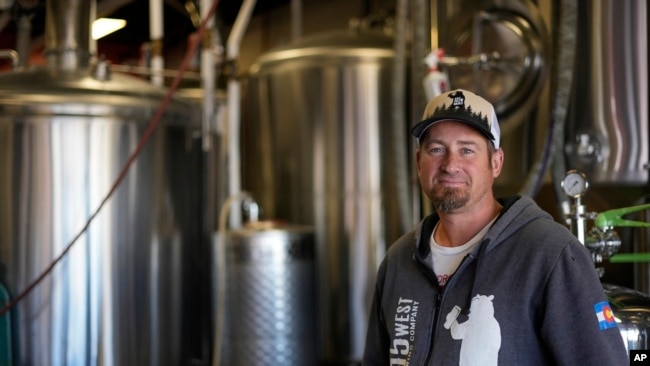水の再利用
水、それは国家の大問題です。
早速Coloradoのケースを通して、飲料水について考えましょう。
VOAで英語を学びましょう!!
コロラド州、米国初の水再利用の州になる可能性(和訳)
Colorado Could Become First US State to Reuse Water
Oct.27,2022
コロラド州の水質局は最近、飲料水への直接再利用に関する規則を早期に承認しました。これは、sewage下水を処理し、最初に大きな水域に入れることなく、直接使用するために送るプロセスです。
11月の最終投票でこの動きが承認されれば、西部のこの州は飲料水直接再利用規則を採用する米国初の州となる、と州および連邦政府関係者は述べています。
コロラド州水質保全委員会のケビン・レイディ氏は、コロラド州の人口が増加するにつれ、飲料水の再利用は減少した水源に対処するための重要な手段であると言います。
水の再利用の処理工程では、通常、廃水をオゾンガスや紫外線でdisinfecting【dìsinfékt】消毒し、ウイルスや細菌を除去します。次に、非常に小さな開口部、または気孔のあるバリアに水を通し、固形物や汚染物質と呼ばれる危険な物質を除去します。
このプロセスは、長期にわたって十分な雨が降らない地域社会への対応として関心を集めています。米国の多くの州は、このような水の再利用を直接的には禁止していませんが、州ごとの規則があれば、より早く導入できるだろうと、レイディ氏は言います。
飲料水の直接再利用に関する正確な連邦規則はありません。しかし、再利用プロジェクトは、飲料水に関する連邦衛生規則に適合していなければなりません。
フロリダ州、カリフォルニア州、アリゾナ州では現在、飲料水の直接再利用に関する規則を策定中です。また、他のいくつかの州では、このプロセスを開始しているか、既存のプロジェクトがあります。コロラド川の水位が下がり続ける中、アリゾナ州は大幅な減水に直面し、カリフォルニア州はその分をさらに譲るよう圧力を強めています。
デンバーとコロラドスプリングスーコロラド州で最も人口の多い都市ーは、すでに他の都市との交流や公園の水やりなど、飲料水以外の用途で水の大半を再利用しています。両市はいつか飲料水として再利用することを期待していますが、関係者はストレスの多いコロラド川からの再利用可能な供給が間もなく削減されることを懸念しています。
デンバーウォーターのグレッグ・フィッシャー氏は、大規模な直接飲料水再利用システムを構築するのにかかる時間を懸念しています。
「大規模な飲料水直接再利用システムを構築して、それが数年でもなければ、いくつかの問題が発生します。」と彼は言います。
「顧客のニーズを満たすために再利用可能な(飲料水)の供給に頼っていると、そのニーズに応える能力が危険にさらされるのです。」フィッシャー氏は付け加えています。
再生水のクリエイティブな利用法
しかし、コロラド州ではすでに再生水をクリエイティブに活用している人たちがいます。
エリック・セウファート氏が2017年に下水を再利用した水でビールのテストバッチを醸造したとき、彼はその結果をあまり気にしていなかったと言います。テストについて連絡してきたエンジニアリング会社がプロセスを説明し、一緒に再生水のサンプルを飲みました。セウファート氏はすぐに、そのプロセスが通常の水の処理方法とあまり変わらないことを理解しました。
「この国のどの川も、誰かが排水を処理して入れているんです。」と彼は言っています。
コロラド州キャッスルロックにある105 West Brewing Co.のオーナーは、ビールを開けて味見した後、今度は他の人たちにこのビールを振る舞いました。
セウファート氏は、再生水でおいしいビールができることをすでに知っています。彼は、ビジネスのコストを抑えることを、より心配しています。
「この地域が手頃な価格で、計画的な成長を遂げるための資源があるかどうかが心配なのです。」と彼は言います。「しかし、今のところ、州当局がそれに取り組んでくれていると信じています。」
Colorado Could Become First US State to Reuse Water
Colorado’s water quality agency recently gave early approval to rules about direct potable reuse. It is a process of treating sewage and sending it directly for use without first putting it in a large water body.
Should the move be approved in a final vote in November, the western state would become the first in the United States to adopt direct potable reuse rules, state and federal officials say.
Kevin Reidy of the Colorado Water Conservation Board said that as Colorado's population increases, drinking water reuse is an important way to deal with reduced water supplies.
The water reuse treatment process usually involves disinfecting wastewater with ozone gas or ultraviolet light to remove viruses and bacteria. Then the water is put through barriers with very small openings, or pores, that remove solids and dangerous materials known as contaminants.
The process is gaining interest as communities deal with long periods without enough rain. While many U.S. states do not directly forbid this kind of water reuse, statewide rules could bring quicker adoption, said Reidy.
There are no exact federal rules for direct potable reuse. However, reuse projects must meet federal health rules for drinking water.
Florida, California and Arizona are now working on rules for direct potable water reuse. And several other states are beginning the process or have existing projects. As the water level of the Colorado River continues to drop, Arizona faces deep water cuts, while pressure grows for California to give up more of its share.
Denver and Colorado Springs — Colorado's most populous cities — already recycle most of their water through exchanges with other cities and for non-drinking uses, such as watering parks. Both cities expect to someday reuse water for drinking purposes, but officials are concerned their reusable supplies from the stressed Colorado River soon could face cuts.
Greg Fisher of Denver Water was concerned about the time it takes to build a large direct potable reuse system.
“If you’ve built a big direct potable reuse system and you don’t have it even for a few years, that causes some problems,” he said.
“If we are relying on those reusable (drinking water) supplies to meet our customers’ needs, our ability to meet their needs is put at risk,” Fisher added.
Creative uses of recycled water
Still, some people in Colorado are already making creative use of recycled water.
When Eric Seufert brewed a test batch of beer in 2017 with water from recycled sewage, he was not too concerned about the outcome. The engineering company that contacted him about the test explained the process, and together they drank samples of recycled water. Seufert quickly understood the process was not too different from how water is normally treated.
“Every … river in this country has someone putting in their wastewater after they’ve treated it,” he said.
After opening the beer and having a taste, the owner of 105 West Brewing Co. in Castle Rock, Colorado now served it to others.
Seufert already knows he can make good beer from recycled water. He is more worried about keeping the cost of business down.
“I’m concerned that the resources will be there for the planned growth in an affordable way for this region,” Seufert said. “But, as of now, I trust that” state officials “are working on it.”
Words in This Story
sewage – n. waste material (such as human urine and feces) that is carried away from homes and other buildings in a system of pipes
wastewater – n. water that has been used in a home or business
recycle – v. to use (something) again; to make something new from (something that has been used before)
batch – n. an amount of something that is made at one time
sample – n. a small amount of something that gives you information about the thing it was taken from
affordable – adj. not costly, inexpensive
region – n. a part of a country, of the world, etc., that is different or separate from other parts in some way
